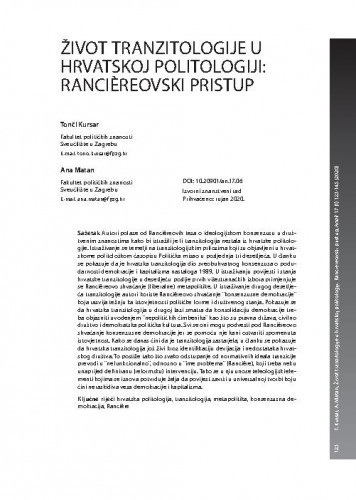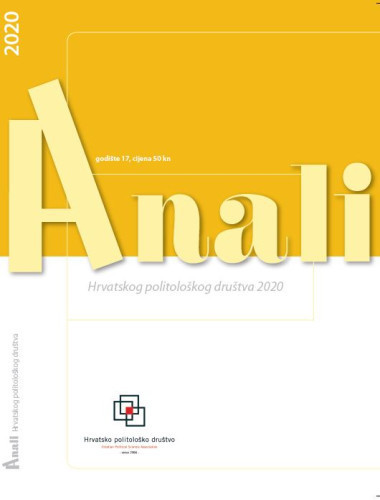Autori polaze od Ranciereovih teza o ideologijskom konsenzusu u društvenim znanostima kako bi istražili je li tranzitologija nestala iz hrvatske politologije. Istraživanje se temelji na tranzitologijskim prilozima koji su objavljeni u hrvatskome politološkom časopisu Politička misao u posljednja tri desetljeća. U članku se pokazuje da je hrvatska tranzitologija dio sveobuhvatnog konsenzusa o podudarnosti demokracije i kapitalizma nastaloga 1989. U istraživanju povijesti i stanja hrvatske tranzitologije u desetljeću poslije prvih višestranačkih izbora primjenjuje se Ranciereovo shvaćanje (liberalne) metapolitike. U istraživanje drugog desetljeća tranzitologije autori koriste Ranciereovo shvaćanje "konsenzusne demokracije" koja razvija težnju ka istovjetnosti političke forme i društvenog stanja. Pokazuje se da hrvatska tranzitologija u drugoj fazi smatra da konsolidaciju demokracije treba objasniti uvođenjem "nepolitičkih čimbenika" kao što su pravna država, civilno društvo i demokratska politička kultura. Svi se oni mogu podvesti pod Ranciereovo shvaćanje konsenzusne demokracije jer se pomoću nje kani ostvariti spomenuta istovjetnost. Kako se danas čini da je tranzitologija zastarjela, u članku se pokazuje da hrvatska tranzitologija još živi kroz identifikaciju devijacija i nedostataka hrvatskog društva. To postiže tako što svako odstupanje od normativnih ideala tranzicije prevodi u "nefunkcionalno", odnosno u "ime problema" (Ranciere), koji treba neku unaprijed definiranu (reformsku) intervenciju. Tako se u nju unose teleologijski elementi kojima se iznova potvrđuje želja da povijest završi u univerzalnoj tvorbi koju čini neraskidiva veza demokracije i kapitalizma.; The authors use Ranciere's theses on the ideological consensus in the social sciences, to confirm or refute ‘the end of transitology’ in Croatian political science. The research is based on articles published in the Croatian political science journal Politička misao in the three decades after the first multiparty elections in Croatia. The authors show that Croatian transitology is part of a comprehensive consensus on the complementarity of democracy and capitalism that emerged in 1989. The analysis of Croatian transitology, in the decade after the first multi-party elections, is based on Ranciere's concept of (liberal) metapolitics. To explore the second decade of transitology, the authors use Rancier’s concept of ‘consensual democracy’ which aspires to achieve identity between political form and the state of social relations. Croatian transitology of the second decade holds that the consolidation of democracy should be explained/supported by the introduction of 'non-political factors' such as the rule of law, civil society and democratic political culture. All these factors can be subsumed under Ranciere's understanding of consensual democracy because they are intended to achieve the condition of identity. Although at present, transitology may seem obsolete, the article shows that (Croatian) transitology still lives a slightly different life by identifying various deviations and shortcomings in Croatian society. It achieves this by translating any deviation from the normative ideals of transition into a 'non-functional' or 'name of the problem' (Ranciere), which then needs some predefined (reform) intervention. In this way we have teleological elements which reaffirm the desire for history to end in a universal formation made up of the unbreakable bond of democracy and capitalism.
Sažetak

 Anali Hrvatskog politološkog društva : časopis Hrvatskog politološkog društva : 17,1(2020) / glavna i odgovorna urednica Mirjana Kasapović.
Anali Hrvatskog politološkog društva : časopis Hrvatskog politološkog društva : 17,1(2020) / glavna i odgovorna urednica Mirjana Kasapović.